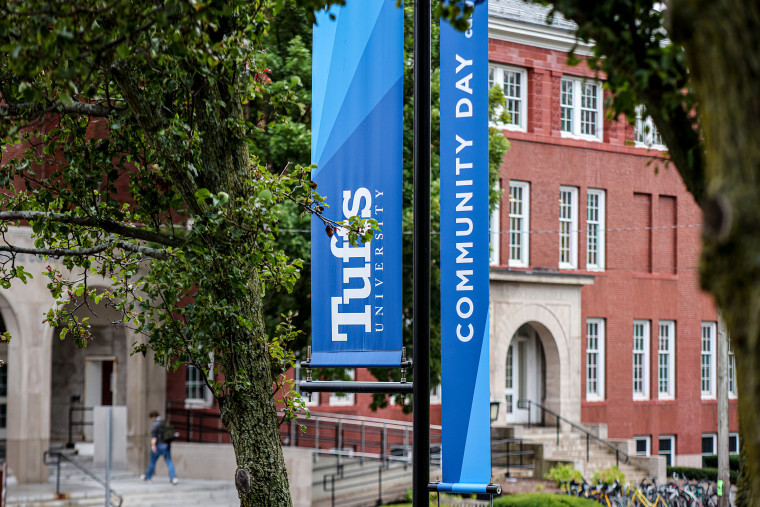Tufts University petitioned a federal judge to release student Rümeysa Öztürk late Wednesday, some of the strongest public pushback by a school against the Trump administration’s arrests of foreign students.
The university’s declaration of support came a day before a hearing in Öztürk’s case that will take place on Thursday in the U.S. District Court for Massachusetts.
Öztürk, a doctoral student from Turkey, was apprehended by immigration authorities on March 25 in Sommerville, Massachusetts, the home of Tufts. She is currently being held at a detention center in Louisiana.
Video shows several Department of Homeland Security officers in plainclothes surrounding Öztürk, grabbing her by the wrists and taking her away into an SUV as she screamed out in confusion.
In its written declaration, Tufts said that it saw no reason for her detention, calling her “a valued member of the community.”
“The University seeks relief so that Ms. Öztürk is released without delay so that she can return to complete her studies and finish her degree at Tufts University,” the university said.
A lawyer for the Department of Justice who is representing the federal government in Öztürk’s case declined to comment.
The Trump administration has cited a rarely used provision in the Immigration and Nationality Act of 1952 to justify Öztürk’s and other students’ arrests in recent weeks. The rarely executed clause allows the secretary of state to deport noncitizens if the secretary determines their presence in the country would result in “potentially serious adverse foreign policy consequences for the United States.”
Esha Bhandari, one of Öztürk’s attorneys, told NBC News that under the Trump administration’s reasoning, they “can use this provision … to suppress all kinds of speech that is opposed to this government’s foreign policy.”
“You can see how opposition to the administration on climate change might be seen as a foreign policy interest, opposition to the government’s policies on Ukraine might trigger foreign policy interests,” she said in a phone call. “Any criticism of the government’s foreign policy itself could be deemed a foreign policy consequence meriting removal.”

Tufts noted in its declaration that Öztürk co-authored an opinion piece in the university’s student newspaper last year, criticizing the university’s response to the war in Gaza and demanding it divest from ties to Israel. The university said that the piece did not violate its policies or “constitute a violation of the University’s understanding of the Immigration and Naturalization Act.”
It also raised concerns that her detention implicated the “free movement” of its international students.
“The University has heard from students, faculty and staff who are forgoing opportunities to speak at international conferences and avoiding or postponing international travel,” the university wrote. “In the worst cases, many report being fearful of leaving their homes, even to attend and teach classes on campus.”
Within the last four weeks, immigration authorities have revoked student visas and apprehended several international students — including Columbia University graduate student Mahmoud Khalil — associated with several universities, including Columbia, Cornell University, Georgetown University. None of the students have been charged with crimes.
Secretary of State Marco Rubio said at a press conference last week that the State Department revoked more than 300 student visas and intends to continue doing so.
“We do it every day. Every time I find one of these lunatics, I take away their visas,” Rubio said.
The universities have issued statements acknowledging the apprehensions and trying to calm student concerns, but have done little to push back against the administration in public.
“Tufts’ statement confirms that it is possible to take a principled position,” Eric Lee, an attorney for a Cornell graduate student whose visa was recently revoked, said in a text message. “It shows that nothing whatsoever requires schools like Cornell, Yale and Columbia collaborate with Trump’s attacks on the Bill of Rights.”
As student arrests pile up, the Trump administration has also paused hundreds of millions of dollars in federal funding to four universities, including Columbia, Harvard University, Princeton University and the University of Pennsylvania.
The administration has accused the universities, aside from Penn, of not doing enough to quell antisemitism on its campuses. The White House said in a statement last month that it was pausing $175 million in federal funding to Penn because the university previously allowed a transgender woman to compete on the university’s women’s swimming team.
The Thursday hearing for Öztürk’s case will take place at 2 p.m. ET. As outlined in a reply brief in support of the amended petition Öztürk’s attorneys filed in court on Wednesday, her attorneys will argue that her detention was retaliatory for the op-ed she published last year and that she should be released immediately.
“Rumeysa’s arrest and detention are designed to punish her speech and chill the speech of others,” the petition reads. “Indeed, her arrest and detention are part of a concerted and systemic effort by Trump administration officials to punish students and others identified with pro-Palestine activism.”
Öztürk’s lawyers also argued that she be returned to Massachusetts from the detention center authorities moved her to in Louisiana. Several other students arrested in recent weeks have similarly been moved thousands of miles away from their homes and sites of their arrests to detention centers in Louisiana. NBC News has previously reported on human rights abuses taking place at detention centers in the state.


